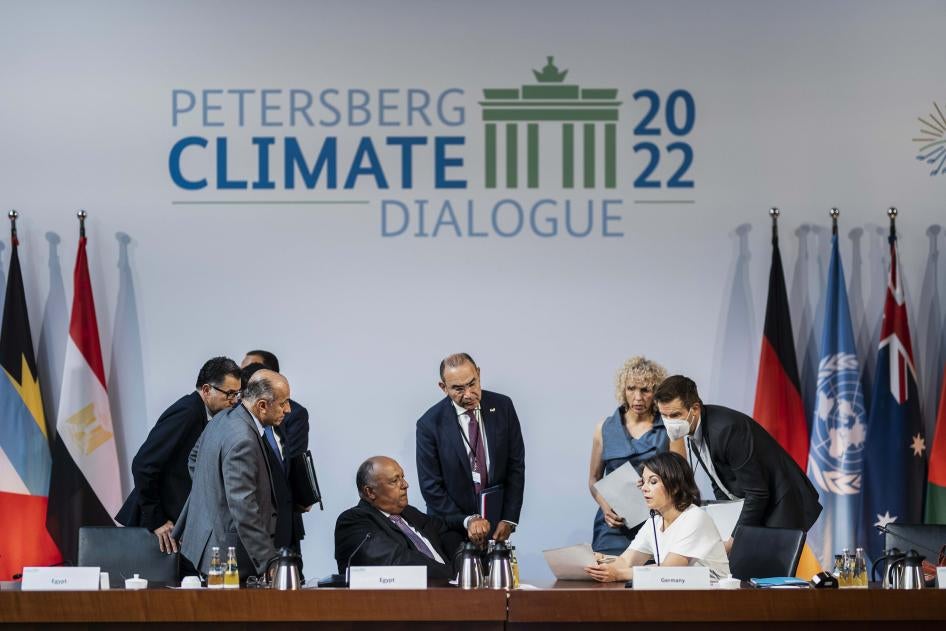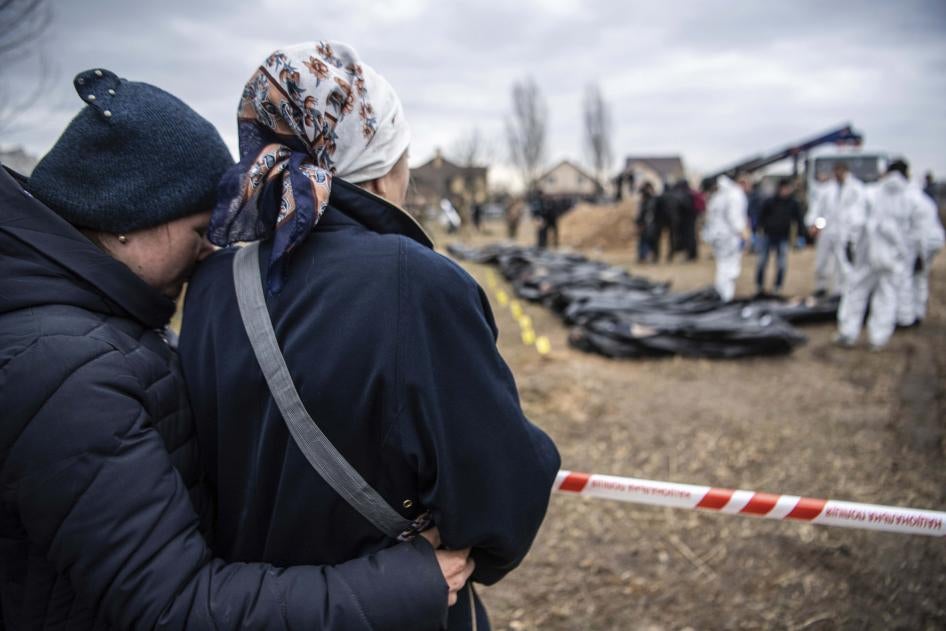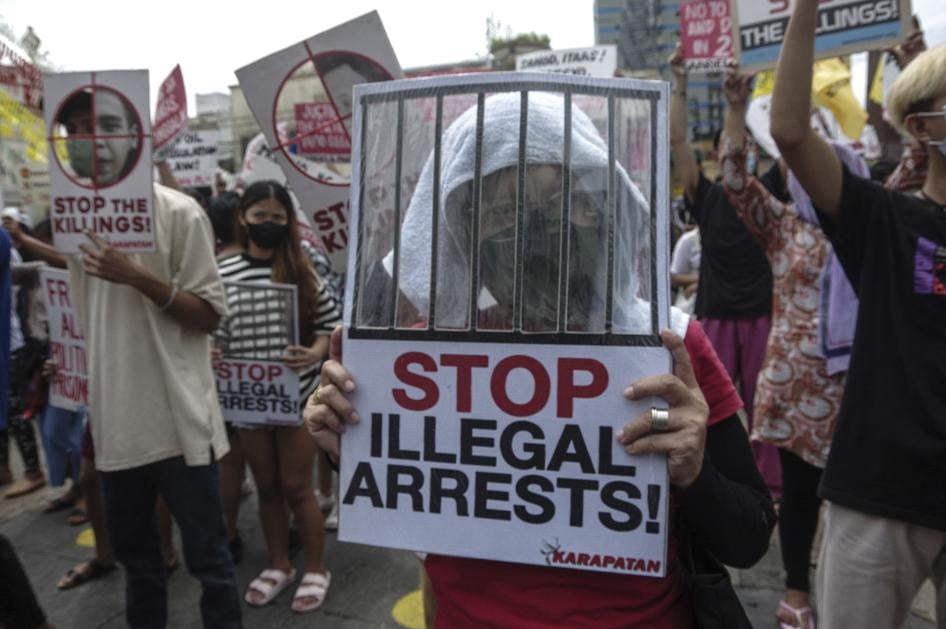Climate Crisis, Climate of Fear: Daily Brief
- Egypt’s Eco-Crackdown ahead of COP27
- What to Expect in Northeast Ukraine
- Philippines: Murder Maintained under Marcos
- Take Note
- About Our Audience
- Name That Podcast!
By Andrew Stroehlein. Contact me at DailyBriefTeam@hrw.org and Twitter @astroehlein.
Good COP, Bad Cops in Egypt
Shut up, environmentalists! We’re holding a conference on the environment!
This is the message the Egyptian government is sending as the country prepares to host the COP27 climate summit in November.
With the global eco-meet-up just two months away, the authorities have severely curtailed Egyptian environmental groups’ ability to carry out their work. Along with surveillance and harassment, they’ve imposed obstacles to funding, research, and even registration that have debilitated local organizations.
As a result, some activists have been forced into exile; others have had to drop important work.
Human Rights Watch has interviewed activists, academics, scientists, and journalists working on environmental issues in Egypt. All have been involved in promoting, advocating for, and working on climate action in some capacity.
They described a sharp reduction in the space for independent environment and climate work since President Abdel Fattah al-Sisi’s government took office in 2014. They detailed harassment and intimidation tactics, including arrests and difficulties travelling.
Of course, environmental groups are not the only targets of the regime. Egyptian authorities have been engaged in a relentless crackdown on civil society generally since 2014.
But you might think that, with the world’s eyes upon them for COP27, the host government would want to ease up a bit and at least recognize the rights to freedom of assembly and association for Egypt’s environmental groups.
You’d think wrong.
Egypt’s endless repression bodes ill for civil society participation at the climate summit itself. As things stand, all but the most pro-government groups are wary of publicly engaging at Sharm El Sheikh for fear of reprisals. Will those critical of the government even be able to register to attend and observe the negotiations, let alone express their positions freely there?
How can humanity address the climate crisis in such a climate of fear?
What to Expect in Northeast Ukraine
Ukraine’s lightning offensive in the northeast of the country has wrested significant areas from Russian control. While many are now discussing the impact this will have on the course of the war, we should also be bracing for what will be found in those areas once under Russian occupation.
If the recent past is anything to go by, it could be grim.
When large areas of territory were liberated around Chernihiv, Kharkiv, and Kyiv regions earlier this year, our researchers and others found evidence of rape, murder, and other violent acts against people in the Russian forces’ custody. In the town of Bucha alone, we documented extensive evidence of summary executions, enforced disappearances & torture.
We have also reported on how Russian forces have tortured, unlawfully detained, and forcibly disappeared civilians in the occupied areas in the south of Ukraine, specifically in Kherson and Zaporizhzhia regions,
Violations like these, north and south, are war crimes & potential crimes against humanity.
Exactly what will be found in the newly liberated territories in the northeast remains to be seen, of course. The evidence will lead where the evidence leads.
But the record of Russian occupation in Ukraine so far leads me to fear what we might now uncover.
Philippines: Murder Maintained under Marcos
The scale of extrajudicial killings by police in the Philippines is simply shocking.
The Office of the UN High Commissioner for Human Rights has calculated that the death toll in the Philippines’ government’s extreme “war on drugs” was at least 8,663. Domestic human rights groups and the government-appointed Philippines Commission on Human Rights say the real number could be triple that.
Even the official government figures don’t try to hide the horror very much: police themselves reported 6,252 deaths in their anti-drug operations between July 2016 and May 2022.
And nothing appears to have changed since President Ferdinand Marcos Jr. took office on June 30. There have been a further 72 drug-related killings, according to Dahas, a program at the University of the Philippines.
That’s about one murder by police a day.
In light of these appalling numbers, we’re hoping that the UN Human Rights Council will adopt a strong resolution addressing the dire situation in the Philippines during its 51st session, which starts today.
_______________________________________________________________
Take Note
(curated today by Alice Autin)
- Also on the UN Human Rights Council’s agenda: China, Russia, Ukraine (Swissinfo.ch)
- Dozens of girls protest in Afghanistan as Taliban shut their schools (again) (Aljazeera)
- 'Don't forget women of Yemen' says UN aid official (EU Observer)
- In Ethiopia, Tigray forces are open to peace talks led by the African Union (DW)
- Millions of Sri Lankans are struggling to eat and access medical products (DW)
- Looking back at 9/11 and its legacy of human rights abuses (HRW)
- The moving story of HRW’s Asia Director’s grandmother, trafficked at age 10 (The Guardian)
- Climate change, Ukraine… Global survey measures people’s reaction to world crises (Open Society)
_______________________________________________________________
About Our Audience
We’ve been looking at some long-term trends in our website audience, watching it shift and become more global. The US remains the most common location of our online readers, at 26% of the overall figure, but it was 36% a decade ago.
Meanwhile India has risen to become our second largest audience, at 10% (from 2% a decade ago), and the Philippines is now in third place, with nearly 6% (from 1.3% a decade ago).
_______________________________________________________________
Name That Podcast!
In Friday’s edition of this newsletter, I asked you for help in naming our new podcast.
Hosted by my colleague, Birgit Schwarz, the as-yet-unnamed podcast will be a deep dive into a different human rights issue every week. The show will be global in outlook and human in approach, with a focus on the voices of activists from around the world.
So far, some of the names you’ve suggested include: Rights Report; Talking Rights; Rights Now; Do It Rights; Do the Rights Thing; Rights and Wrongs; Defending Rights; and Rightz.
Please keep the ideas coming: email me or contact me on Twitter with your suggestions.
_______________________________________________________________
Help promote human rights – forward this email to others & encourage them to sign up here.


